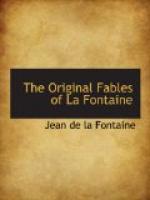“And what, my Thyrsis, is the name you give this pleasing pain?”
“It is called love,” said Thyrsis.
“Ah!” responded the maiden, “that is a beautiful name. Tell me by what signs I may know it, if it come to me. What are the feelings it gives one?”
Thyrsis, taking heart of grace, replied with much ardour: “One feels an anguish beside which the joys of kings are but dull and insipid. One forgets oneself, and takes pleasure in the solitudes of the woods. To glance into a brook is to see, not oneself, but an ever-haunting image. To any other form one’s eyes are blind. It may be that there is a shepherd in the village at whose voice, at the mention of whose name, you will blush; at the thought of whom you will sigh. Why, one knows not! To see him will be a burning desire, and yet you would shrink from him.”
“Oho!” said Amaranth. “Is this then the pain you have preached so much! It is hardly new to me. I seem to know something of it.” The heart of Thyrsis leapt, for he thought that at last he had gained his end; when the fair one added, “’Tis just in this way that I feel for Cladimant!”
Imagine the vexation and misery of poor Thyrsis!
How many like him, intending to work solely for themselves, prove only to have been stepping stones for others.
XIX
THE RAT AND THE ELEPHANT
(Book VIII.—No. 15)
An uncommonly small rat was watching an uncommonly big elephant and sneering at the slowness of his steps.
The enormous animal was heavily laden. On his back rose a three-storied howdah, wherein were accommodated a celebrated sultana, her dog, her cat, her monkey, her parrot, her old servant, and all her household. They were going upon a pilgrimage.
The rat wondered why all the people should express astonishment at seeing this enormous bulk—“As if the fact of occupying more or less space implied that one was the more or less important accordingly! What is it you admire in him, you men? If it is only the weight of his body which fills the children with terror, then we rats, small as we are, consider ourselves not one grain less than the elephant.” He would have said more; but the cat, bounding out of her cage, let him see in an instant that a rat is not an elephant.
XX
THE HOROSCOPE
(Book VIII.—No. 16)
Our destiny is frequently met in the very paths we take to avoid it.




